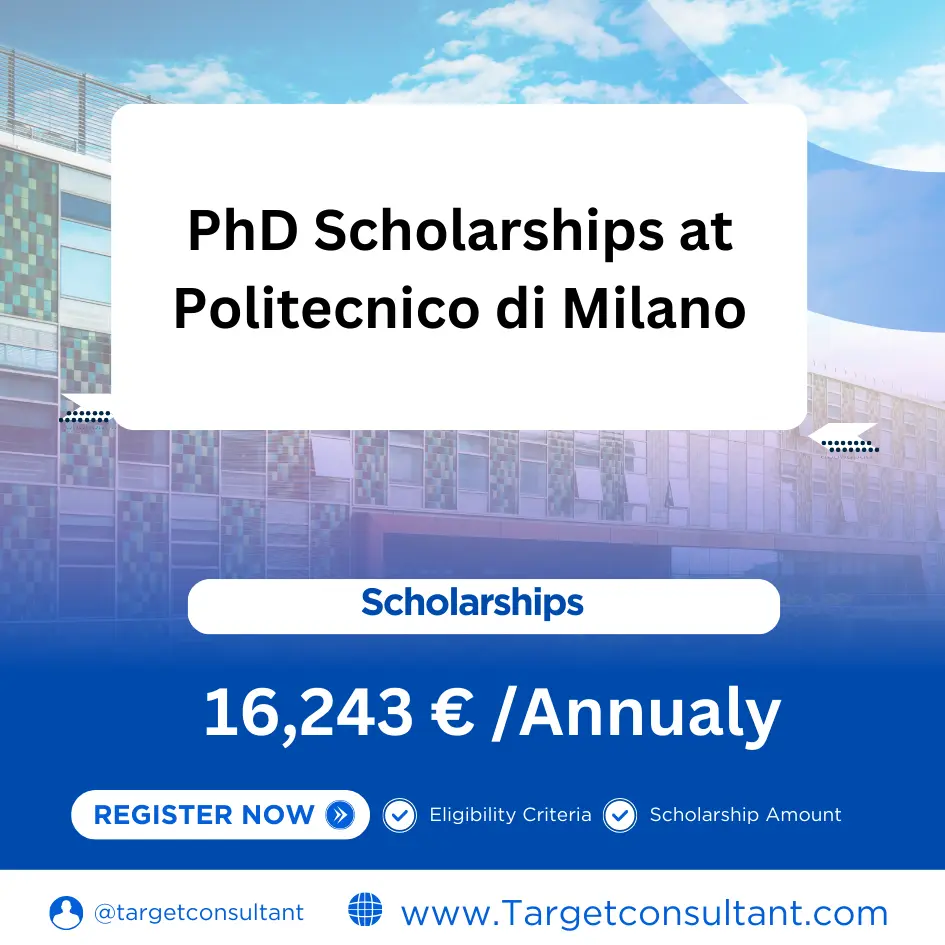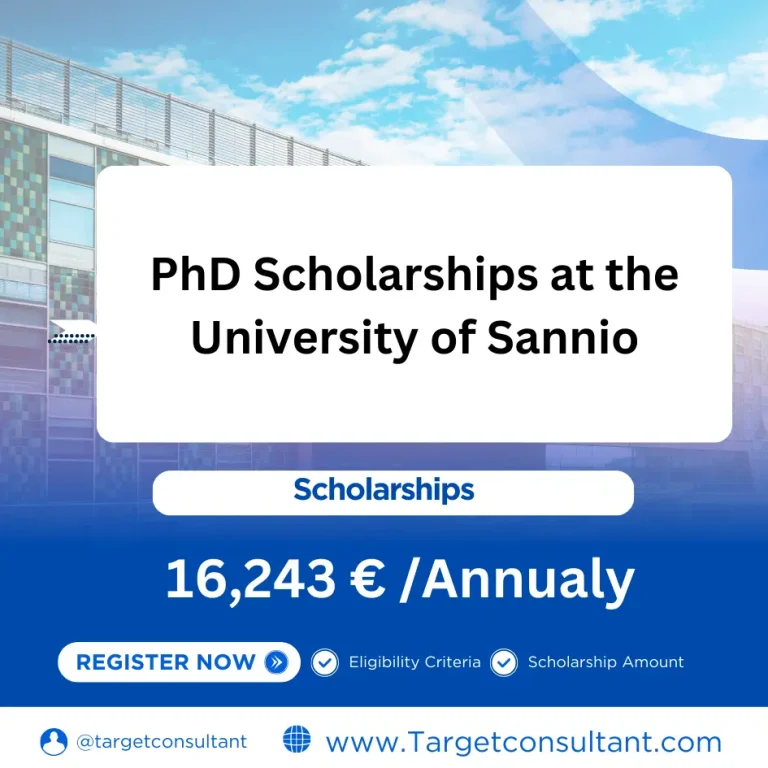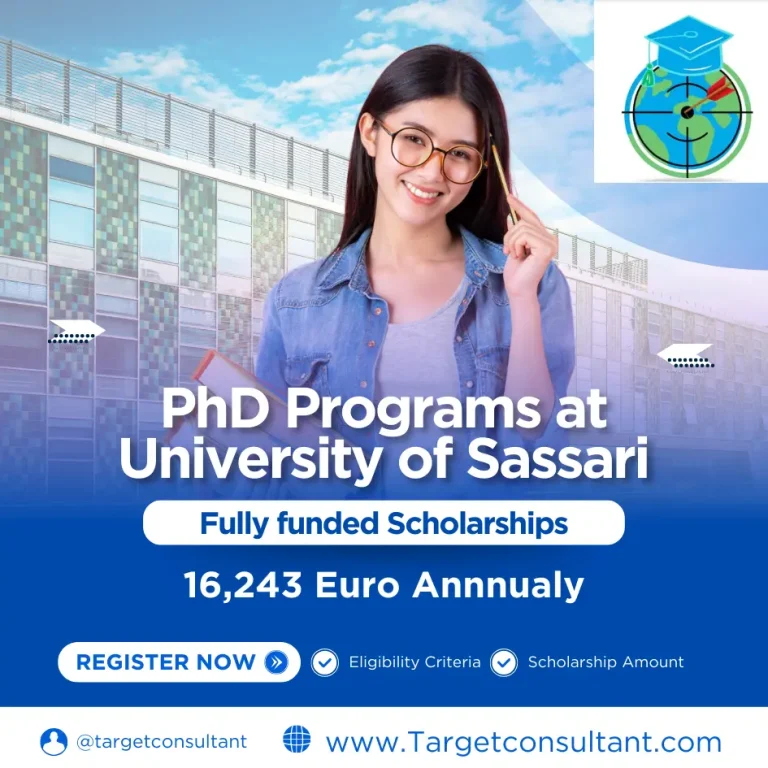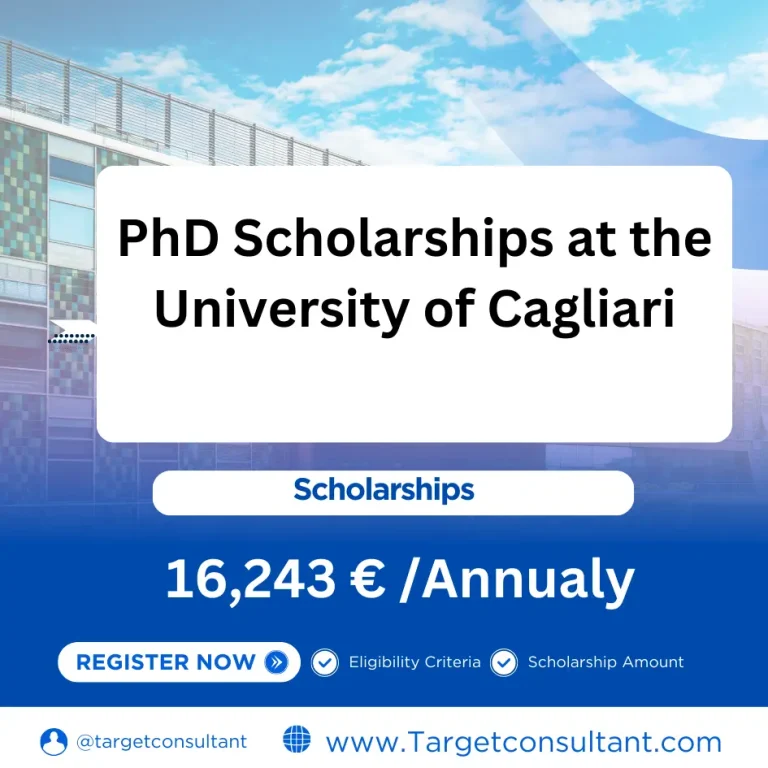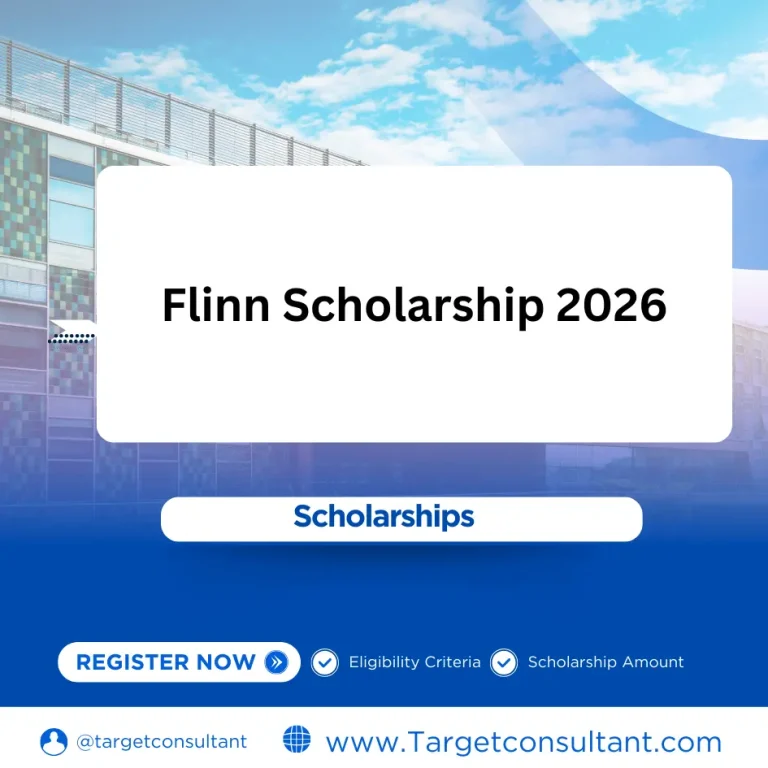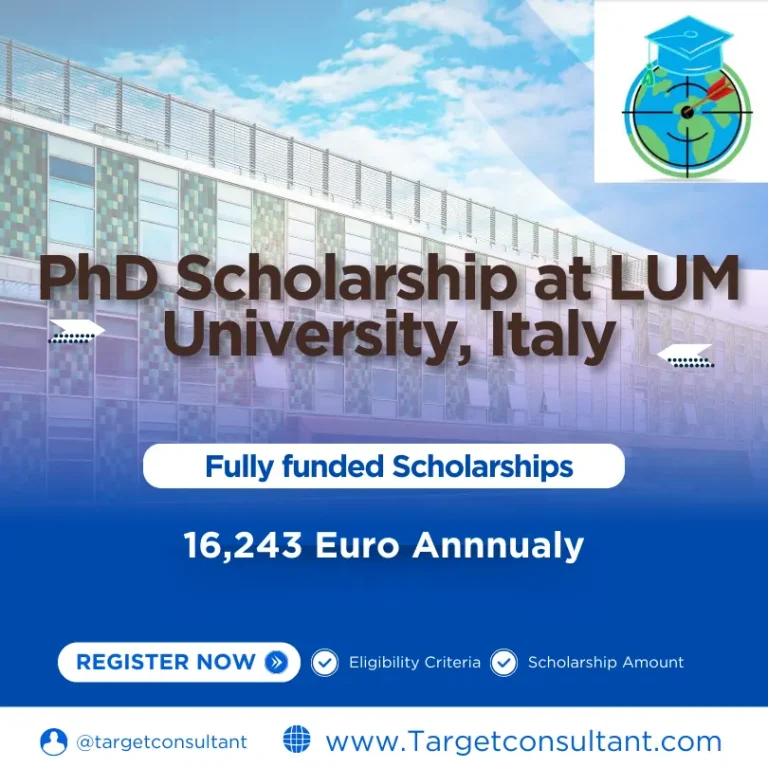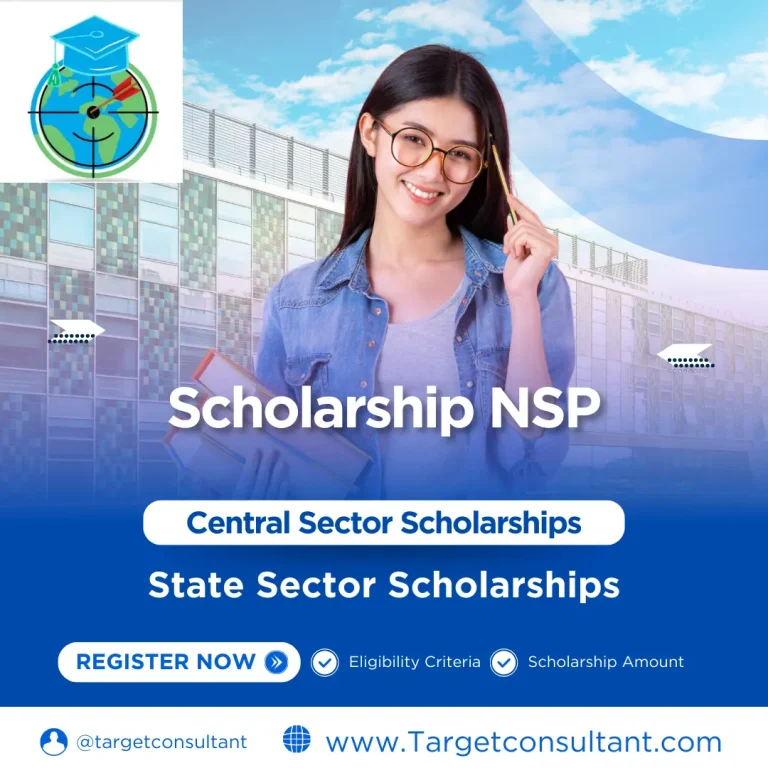PhD Scholarships at Politecnico di Milano 2025: Fully Funded Programs in Engineering, Design & AI
Looking for a fully funded PhD in Italy with global recognition, cutting-edge research, and a €16,243/year stipend?
The Politecnico di Milano (Polimi) — Italy’s top-ranked university for engineering and technology — is now accepting applications for its 41st Cycle of PhD Programs (2025–2028) through an additional call.
With 60+ fully funded positions across 18 departments, including Artificial Intelligence, Aerospace, Sustainable Energy, Bioengineering, and Urban Design, this is a golden opportunity for Italian and international students.
In this complete 2025 guide, you’ll learn:
- All available PhD programs and research topics
- Funding, stipend, and benefits
- Application deadline and process
- Eligibility for international students
- Tips to strengthen your application
- How to apply via the online portal
Perfect for students from worldwide.
Why Choose Politecnico di Milano for Your PhD?
Ranked among the top 20 universities in Europe for Engineering & Technology, Politecnico di Milano is a global leader in:
- Research innovation (Horizon Europe, PNRR projects)
- Industry collaboration (Ferrari, Leonardo, Siemens, Eni)
- Interdisciplinary programs (AI, sustainability, smart cities)
- English-taught PhDs (no Italian required)
- High employability (90% of PhDs get jobs or postdocs)
The university offers fully funded PhD scholarships with a gross annual stipend of €16,243, no tuition fees, and access to state-of-the-art labs.
🔗 Official Call: https://www.dottorato.polimi.it/futuri-dottorandi/bandi-e-regolamenti/ciclo-41/2-bando-aggiuntivo-2025-26
Open PhD Programs – 41st Cycle (2025)
Politecnico di Milano is offering 60+ fully funded PhD positions across 18 departments. Below is a complete list of programs and research topics from the Additional Call 2025/2026.
🏗️ 1. Architectural, Urban & Interior Design
- Theme: Methods and Tools for the Revamping/Decommissioning of End-of-Life Ground-Mounted Photovoltaic Installations
Focus: Sustainable design, solar panel lifecycle, urban planning
🏗️ 2. Architecture, Built Environment & Construction Engineering
- Theme: Healthcare Infrastructures Requirements Toward User-Centered Care for Developing Contexts
Focus: Medical architecture, low-cost healthcare design, global health
🧬 3. Bioengineering
Multiple funded positions in:
- Robotic Assistant for Minimally Invasive Surgery
- Biomedical Technologies for Telerehabilitation
- Engineering of PETase Enzymes for Plastic Biodegradation
- Bioimpedance Sensing in Head & Neck Oncology
- Wearable Systems for Lymphedema Monitoring
- Organs-on-Chip Platforms
- AI in Intraoperative Risk Assessment
Focus: AI in surgery, biotech, sustainability, medical devices
⚗️ 4. Industrial Chemistry & Chemical Engineering
- Advanced Chemical Processes with Single-Atom Catalysts
- Multiscale Modeling of Electrified Catalytic Reactors
- Catalytic CO2 Hydrogenation to E-Fuels
- Ionic Liquids & Eutectic Systems
- Kinetic Modeling of Hydrocarbon Pyrolysis
- Odour Characterization & Measurement
- Biomimetic Peptide Self-Assembly
- Sustainable Hydrogen Storage (H2-STORM)
- Catalysis for Energy & Environment
Focus: Green chemistry, hydrogen economy, carbon capture
🏛️ 5. Built Heritage Conservation
- Innovating Cultural Heritage Evaluation & Accounting
Focus: Heritage preservation, public policy, cultural economics
📊 6. Data Analytics and Decision Sciences
- Machine Learning for Genotoxicity Detection in Gene Therapy
- AI for Spatiotemporal Processes in Biomedicine
- Statistical Genomics of Single-Cell Data
- Mathematical Modelling of Stochastic Biological Processes
Focus: AI, data science, genomics, healthcare analytics
🔬 7. Physics
- Microelectronic Devices with Lead-Free Piezoelectrics
- Edible Batteries
- ML-Enhanced Miniaturized Sensors for Environmental Monitoring
- Vertical Integration of 2D Materials for 3D CMOS
- Nonlinear Optical Platforms with 2D Materials
- Ultralow Power Transistors with Ferroic Materials
- Quantum Materials for Super-Efficient Solar Panels
- Hyperspectral Devices
Focus: Nanotech, quantum materials, sustainable electronics
🛰️ 8. Aerospace Engineering
- Model Order Reduction for Crashworthiness Analysis
- Multifunctional Space Structures with Embedded Sensing
- 3D-Printed Green Propulsion Engines
- Real-Time Computing in Rhinology
- Autonomous Guidance for Self-Driving Spacecraft
- Wind Energy System Design
- Mission Analysis for E.Cube Satellite
- Flight Simulation for Autonomous Aircraft
- Collision Avoidance for Space Debris
- MBSE for Space Instruments
- Power Supply Solutions for Space Infrastructure
Focus: Space tech, green propulsion, AI in aerospace
🌍 9. Environmental & Infrastructure Engineering
- Cryogenic Weathering & Self-Healing of Mineral-Water Interfaces
- Environmental & Hydraulic Engineering
- Integrated Surface-Subsurface Modeling
- Autonomous Control Valve for Compressible Flow
- Sewage Sludge to PHA & Phosphorus Salts
- Innovative Devices for Hydraulic Infrastructure Optimization
Focus: Water systems, waste valorization, climate resilience
🧱 10. Materials Engineering
- Electroplating of Functional Metallic Layers
- Functionalization of Plastic Surfaces
- Welding Strength in Packaging
- Quantum Computing for Crystallography
- CO2 Inclusion in Metal-Organic Cages
Focus: Smart materials, recycling, quantum tech
💻 11. Information Technology
One of the largest departments with 30+ funded positions:
- Computer Science & Engineering
- Continuous Multimodal Foundation Models (TEF)
- Hybrid HPC-Embedded Architecture for Tumor Digital Twin
- Learning Algorithms with Human Feedback
- Adaptive Filtering & Sensing
- AI for Cyber Threat Detection
- Fair-by-Design Medical Data Models
- Reinforcement Learning for Energy Markets
- Intelligent Agents for Trading Strategies
- AI for Egoaction Recognition on Smart Eyewear
- Human-in-the-Loop Explainability for LLMs
- Compiler Optimization for Emerging Architectures
- Radiation Detectors with ML Readout
- ASICs for Planetary Spectroscopy
- Low-Noise Mass Spectrometry Electronics
- Low-Power Eye Tracking
- Ultrasound Sensing at Short Distance
- Integrated Electronics for Photonic Circuits
- Single Photon Detectors
- Multilevel Switched-Capacitor DC/DC Converters
- NEMS Arrays for Inertial Navigation (NAPKIN)
- Biomarker Detection Sensors
- Nonvolatile Memories in AI
- Low-Energy In-Sensor Computing for MEMS
- Inverse Reinforcement Learning for Water Reservoirs
- 6G Wireless Communication
- AI-Driven IoT Scheduling in Wi-Fi 7/8
- Quantum Error Correction for Distributed Computing
Focus: AI, cybersecurity, quantum computing, embedded systems, 6G
⚡ 12. Electrical Engineering
- Autonomous Electric Vehicle Fleets & Infrastructure
- Electromagnetic Sensing & Learning for Monitoring (SMARTEYE)
- Measurement & Instrumentation
Focus: EVs, smart grids, sensor networks
🏢 13. Management Engineering
- AI for Sustainability & Resilience
- Cultural Tourism for Sustainability
- Supply Chain Sustainability in Food Industry
- AI-Driven Platform for Construction Project Governance (BUILDAI4PM)
- AI for Insurance Risk in Work Safety (INAIL)
- Global Competitiveness & Green Transition (EV Industry in China)
- Digital Innovation in Family Enterprises
- Well-Being in Ageing Workforce & Technology
- Governance in Family Firms
- Role of Biofabricated Materials in Made in Italy
Focus: AI in business, sustainability, innovation
🔧 14. Mechanical Engineering
- Machine Learning in Wheel-Rail Damage (Condition-Based Maintenance)
- Fracture Assessment for High-Temp AM Components
- Solid-State Cooling via Piezoelectric Flow Control
- Surface Treatments for Fatigue Resistance
- Meta-MEMS-Based Physical Neural Networks
- Digital & Physical Twins of the Human Body
- Numerical Modelling of Composite Structures
- Additive Manufacturing of Multimaterials
- AI for Additive Manufacturing & Bioprinting
- Shape Memory Alloy Hexapod Systems
- Optimal Control of Swarms
- Laser-Based Manufacturing Solutions
- In Situ SEM Testing of Superalloys
- Aerodynamic Optimization of Trains
Focus: AI, additive manufacturing, robotics, smart materials
🏗️ 15. Structural, Seismic & Geotechnical Engineering
- Microstructural Aspects of Vitreous Humour Liquefaction (for eye treatments)
Focus: Biomedical engineering, materials science
➗ 16. Mathematical Models & Methods in Engineering
- Mathematical Models in Engineering
- Reduced Models for Oil Leakage from Wind Turbines
- NEMESIS: Next-Gen Numerical Simulations
- Bayesian & Physics-Informed Learning for Kinetic Models
- New Perspectives in Portfolio Selection
- Modeling & Optimization of Vertical Farming for Space Missions
Focus: AI, modeling, space tech, finance
🌱 17. Science, Technology & Policy for Sustainable Change
- Ethical Issues in Academic Research on Defence Tech
- AI for Climate Tipping Points & Adaptation Planning
- Modeling Climate Risk Perception via Social Learning
Focus: Policy, ethics, climate change, AI
⚡ 18. Energy & Nuclear Science & Technology
- Dynamic Optimal Planning of Multienergy Systems
- NUKE4SPACE: Lunar Integrated Energy System
- SPECT System for Boron Neutron Capture Therapy
- Nuclear Reactors for Ship Propulsion
- 2D Materials for Advanced Applications
- Thermal Energy Storage with Phase Change Materials
- Energy Flexible Buildings
- Fault Detection in HVAC Systems
- Safeguards-by-Design for Molten Salt Reactors
- Boundary Plasma Modelling in Tokamaks
- Plasma-Exposed Materials Research
- Flexible & Reliable Multi-Energy Systems
- Protective Coatings for Nuclear Reactors
- Pressurized Solid Oxide Cells
- AI for Predictive Maintenance
- Ionic-Liquid Bubble Column Reactors
Focus: Nuclear energy, fusion, smart grids, space energy
PhD Funding & Scholarships
All admitted students receive:
✅ 3-year scholarship with a gross annual stipend of €16,243
✅ No tuition fees
✅ Research and travel budget
✅ Access to labs, libraries, and industry partners
✅ Opportunities for teaching and research assistantships
The scholarship is awarded through a competitive selection process based on:
- Academic transcripts
- Research proposal (1,500–2,000 words)
- CV and publications
- Interview or written test
Application Process & Deadline
Key Dates:
- Call Published: July 2025
- Application Deadline: 30 September 2025 at 14:00 CEST
- Selection Process: October–November 2025
- Program Start: November 2025
Apply Here: https://servizi-online.polimi.it
📝 How to Apply:
- Register on Servizi Online (Polimi’s portal)
- Log in with your person code and password
- Go to: Servizi Online → PhD Admission Request → Additional Calls
- Upload:
- Research project (format provided)
- Passport or ID copy
- Academic transcripts
- CV (EU format)
- Research proposal
- Submit before the deadline
Note: Each PhD position has a unique ID (e.g., 5162-4619). Make sure you apply for the correct one.
🌍 International Students: What You Need to Know
- Language: All programs are in English
- Visa Support: Polimi assists with study visa applications
- No IELTS? Use a Medium of Instruction (MOI) certificate
- Cost of Living: €800–€1,200/month (Milan is expensive, but stipend covers it)
- Accommodation: Limited on-campus housing; apply early
Tips to Boost Your PhD Application
- Write a strong research proposal aligned with the theme.
- Contact the supervisor before applying.
- Highlight technical skills (Python, MATLAB, CAD, etc.).
- Show research experience (thesis, publications, internships).
- Apply early — competition is high!
Useful Links
- 🌐 Official PhD Call (Polimi)
- 📄 Servizi Online Portal
- 📧 PhD Office Email: [email protected]
- 📍 Address: Politecnico di Milano, Piazza Leonardo da Vinci, 32 – 20133 Milan, Italy
Conclusion
The PhD Scholarships at Politecnico di Milano offer a world-class research experience in one of Europe’s most innovative universities.With 60+ fully funded positions across engineering, AI, sustainability, and design, this is your chance to work on cutting-edge projects with global impact.If you’re aiming to start your PhD in 2025, don’t miss the 30 September deadline — prepare your documents now and take the next step in your research journey.
If you need our help, contact us.

